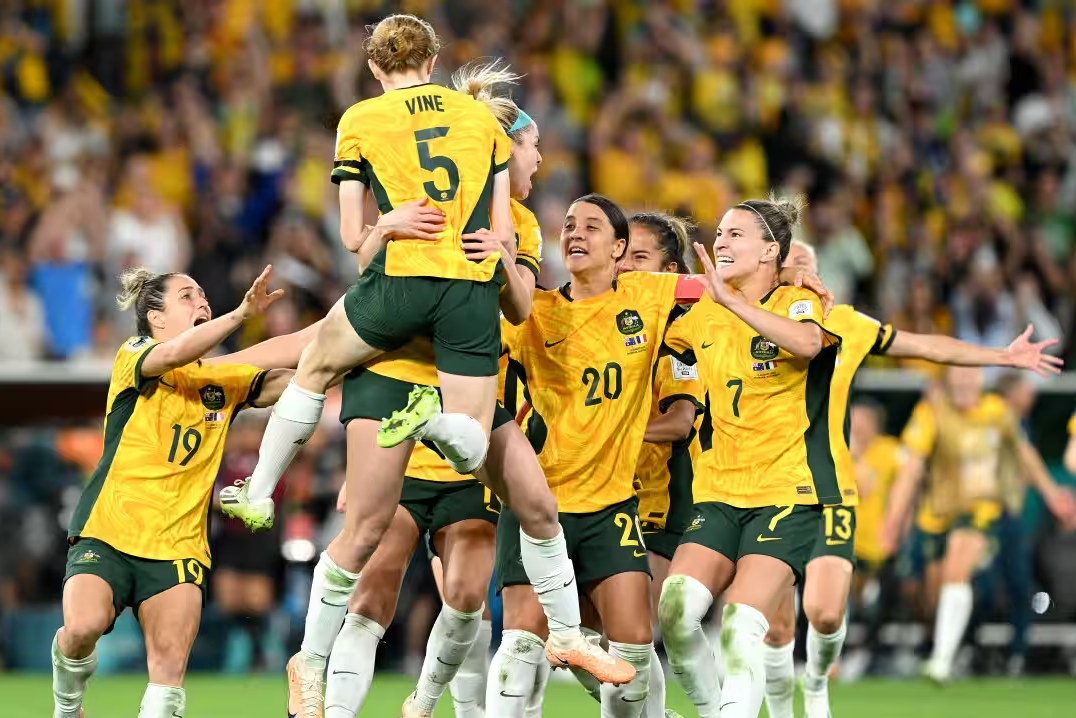Sporting events in the on-premise have traditionally been men’s sports, but the popularity and success of the Matildas has revealed a growing interest in women’s sports.
Seven announced that the viewership of last night’s semi-final hit 11.15 million – about 42 per cent of the population – a number which does not account for the massive crowds in pubs and other venues. This makes the Matildas game the most watched television program since the current rating system was established in 2001. The Australia vs France quarter final was previously the most watched program in over a decade, with an average audience of 4.17 million.
In the on-premise, the popularity of the Women’s World Cup has resulted in record attendances for many venues, some even outside peak trading times. It is also worth noting that these events have often seen higher numbers of women patronising venues, drawing in a wider audience than traditional men’s sporting events. The viewership of the Women’s World Cup has also skewed towards the 18-35 demographic, a younger audience than traditional sporting occasions.
According to John Green, Director Liquor and Policing for AHA NSW, people are looking for community during the game.
“Interest in the tournament has been unprecedented – with last Saturday evening’s patron numbers easily outdoing State of Origin for example,” said Green.
“People are clearly opting for pubs or live sites to get behind the Matildas and watch the match out with friends rather than sitting at home – there’s a real community spirit involved that’s good to see,” he added.
Alastair Flower of Flower Hotels echoed the sentiment.
“You do compete with the cold and compete with the warmth from the convenience of the lounge room […] but you’re not going to get that really euphoric atmosphere that you’ll get at the pub. We made a real thing of making sure that there was a real hype and fun atmosphere in the venue to attract people in,” Flower said.
As with traditional sporting events, advertising game nights is key in drawing crowds to the on-premise.
“We know from our research fans usually plan their attendance a few days out and the ability to book a table and secure a spot, as well as know for sure that the game will be played with sound, are two key offerings,” explained Patrick Galloway, co-founder of Sportsyear.
He also recommends targeting advertising to customers that already frequent your venue.
“Focusing on getting return visits from people who already love your venue will yield a much stronger return than having to market to a whole lot of people who have never heard of you.”
Flower saw particular success with engaging the staff with the game, and encouraging them to promote matches via social media.
“It is really important to have the staff fully engaged. A lot of what we’ve been doing as the management team has been making sure that all our staff are fully aware of the progress of the World Cup. It creates talking points, it creates discussions with patrons,” Flower described.
Additionally, engaging with local sports teams has drawn in excited and dedicated crowds to Flower Hotels venues, and even saw goalkeeper Mackenzie Arnold give a shoutout to Port Macquarie’s Settlers Inn.
Though they ultimately lost the game to England, the Matildas are the first Australian team to reach the FIFA semi-finals. Galloway is optimistic about the effects of the Matilda’s success on women’s sport.
“The 2023 FIFA Women’s World Cup and the success of Australia’s national women’s team the Matildas is a really significant moment in Australian sport that should not be understated. In this case, it’s not only providing the country with some wonderful and inspiring sporting memories – like many other seismic sporting moments but in this case, it’s actually changing the way that many perceive women’s sport,” Galloway enthused.
Flower noted that while patriotic pride did play a role in the popularity of Matildas games, interest and participation in women’s sports is growing in his local community.
“We’ve seen a massive increase of participation [of women], particularly with soccer, rugby league and rugby union, so it’s certainly certainly something that our target market in the community are wanting. We are certainly making sure that we’re appealing to whatever the community is asking for,” he said.
The popularity of the Women’s World Cup has shown the potential in screening women’s sport, and alerted publicans to the new audience the games draw in.
“The rise of women’s sport will lead to some really interesting opportunities for venues looking to use live sport to strengthen or differentiate their unique venue experience. For example, a sports bar that only plays women’s sport recently opened in the Portland USA called “The Sports Bra”. I’d encourage operators to have a look at this because I think it highlights what’s now becoming an option,” said Galloway.
Canberra’s The Alby has seven dedicated sports screens in the venue, and has always shown women’s sports in the venue. Manager Mike Kadinski hopes that the increased interest following the World Cup will create more opportunities to screen women’s sport in the future.
“I believe that all sports should be shown equally. […] Naturally, the biggest games get the most TV time, but in saying that, as women’s sport gains more traction and subsequent popularity we will certainly give them more coverage,” Kadinski said.
Even though the Matildas are not going to the final, there is still significant interest in the Womens’s World Cup decider between England and Spain this coming Sunday. Not to mention that there is still one more Matildas game left, as they compete against Sweden for the third place spot on Saturday.

